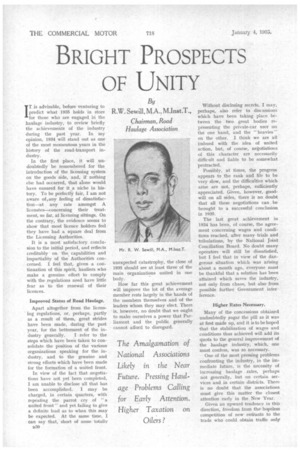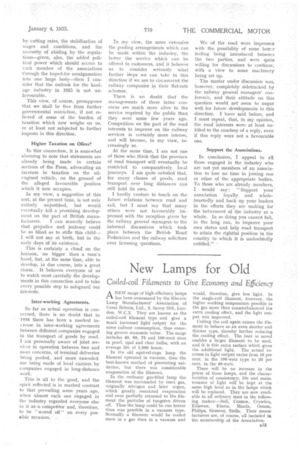BRIGHT PROSPECTS OF UNITY
Page 40

Page 41

If you've noticed an error in this article please click here to report it so we can fix it.
By
Sewill, M.A., M.Inst.T.,
Chairman, Road Haulage Association
IT is advisable, before venturing to predict what 1935 holds in store for those who are engaged hi the haulage industry, to review briefly the achievements of the industry during the past year. In my opinion, 1934 will stand out as one of the most momentous years in the history of the road-transport industry.
In the first place, it will undoubtedly be remembered for the introduction of the licensing system on the goods side, and, if nothing else had occurred, that alone would have ensured for it a niche in history. To be perfectly fair, I am not aware of4any feeling of dissatisfaction—at any rate amongst A licensees—concerning their treatment, so far, at licensing sittings. On the contrary, the evidence seems to show that most licence holders feel they have had a square deal from the Licensing Authorities.
It is a most satisfactory conclusion to the initial period, and reflects creditably on the capabilities and impartiality of the Authorities concerned. I feel that, given a continuation of this spirit, hauliers who .make a genuine effort to comply with the regulations need have little fear as to the renewal of their licences.
Improved Status of Road Haulage.
Apart altogether from the licensing regulations, or, perhaps, partly as a result of them, great strides have been made, during the past year, for the betterment of the in dustry generally. I refer to the steps which have been taken to consolidate the position of the various organizations speaking for the industry, and to the genuine and strong efforts which have been made for the formation of a united front.
In view of the fact that .negotiations have not yet been completed, I am unable to disclose all that has been accomplished. I may be charged, in certain quarters, with repeating the parrot cry of "a united front" and yet failing to give a definite lead as to when this may be expected. At the same time, I can say that, short of some totally 1330 unexpected catastrophy, the close of 1935 should see at least three of the main organizations united in one body.
How far this great achievement will improve the lot of the average member rests largely in the hands of the members themselves and of the leaders whom they may elect. There is, however, no doubt that we ought to make ourselves a power that Parliament and the public generally cannot afford to disregard. Without disclosing secrets, I may, perhaps, also refer to discussions which have been taking place between the two great bodies representing the private-car user on the one hand, and the "heavies on the other. I think we are all imbued with the idea of united action, but, of course, negotiations of this character are necessarily difficult and liable to be somewhat protracted.
Possibly, at times, the progress appears to the rank and file to be very slow, and the difficulties which arise are not, perhaps, sufficiently appreciated. Given, however, goodwill on all sides, there is no doubt that all these negotiations can be brought to a successful conclusion in 1935.
The last great achievement in 1934 has been, of course, the agreement concerning wages and conditions reached, after many trials and tribulations, by the National Joint Conciliation Board. No doubt many operators will still be dissatisfied, but I feel that in view of the dangerous situation which was arising about a month ago, everyone must be thankful that a solution has been attained which saves the industry, not only from chaos, but also from possible further Government inter ference.
Higher Rates Necessary.
Many of the concessions obtained undoubtedly sugar the pill as it was at first made up, and it is to be hoped that the stabilization of wages and conditions thus achieved will add its quota to the general improvement of the haulage industry, which, one must confess, was so necessary.
One of the most pressing problems confronting the industry, in the immediate future, is the necessity of increasing haulage rates, perhaps not generally, but on certain services and in certain distrkts. There is no doubt that the associations must give this matter the closest attention early in the New Year.
Given an upward tendency in this direction, freedom from the hopeless competition of new entrants to the trade who could obtain traffic only by cutting rates, the stabilization of wages and conditions, and the necessity of abiding by the regulations—given, also, the added political power which should accrue to each member of the associations through the hoped-for amalgamation into one large body—then I consider that the outlook for the haulage industry in 1935 is not unfavourable.
This view, of course, presupposes that we shall be free from further governmental restriction, if not relieved of some of the burden of taxation which now weighs on us, or at least not subjected to further imposts in this direction.
Higher Taxation on Oilers?
In this connection, it is somewhat alarming to note that statements are already being made in certain sections of the Press, advocating an increase in taxation on the oilengined vehicle, on the ground of the alleged favourable position which it now occupies.
In my view, a suggestion of this sort, at the present time, is not only entirely unjustified, but would eventually kill a promising development on the part of British manu facturers. I can scarcely believe that prejudice and jealousy could be so blind as to stifle this child— I will not say at birth, but in the early days of its existence.
This is certainly a cloud on the horizon, no bigger than a man's hand, but, at the same time, able to develop, in due course, into a great storm. It behoves everyone of us to watch most carefully the developments in this connection and to take every possible step to safeguard Our interests.
Inter-working Agreements.
So far as actual operation is concerned, there is no doubt that in 1934 there has been a marked increase in inter-working agreements between different companies engaged in the transport of goods by road. I am personally aware of joint services in operation between two and more concerns, of terminal deliverieS being pooled, and more extended use being made of local carriers by companies engaged in long-distance work.
This is all to the good, and the spirit reflected is in marked contrast to that prevailing some years ago, when almost each one engaged in the industry regarded everyone else in it as. a. competitor and, therefore, to be "scored oif " on every possible occasion.
In my view, the more extensive the pooling arrangements which can be made within the industry, the better the service which can be offered to customers, and it behoves us to consider seriously what further steps we can take in this direction if we are to circumvent the railway companies in their flat-rate schemes.
There is no doubt that the managements of these latter concerns are much more alive to the service required by the public than they were some few years ago. Competition on the part of the road interests to improve on the railway services is certainly more intense, and will become, in my view, increasingly so.
At the same time, I am not one of those who think that the province of road transport will eventually be restricted to comparatively local journeys. I am quite satisfied that, for many classes of goods, road transport over long distances can still hold its own.
I hardly venture to touch on the future relations between road and rail, but I must say that many others were not favourably impressed with the reception given by the railway general managers to the informal discussions which took place• between the British Road Federation and the railway solicitors over licensing questions.
We of the road were impressed with the possibility of some better feeling being introduced between the two parties, and were quite willing for discussions to continue, with a view to some machinery being set up.
The matter under discussion was, however, completely sidetracked by the railway general managers' conferenCe, and their attitude on this question would not seem to augur well for future developments in this direction. I have said before, and I must repeat, that, in my opinion, the road interests were at least entitled to the courtesy of a reply, even if this reply were not a favourable one.
Support the Associations.
In conclusion, I appeal to all those engaged in the industry who are not yet members of an association to lose no time in joining one or other of the appropriate bodies. To those who are already members, I would say: "Support your association loyally and wholeheartedly and back up your leaders in the efforts they are making for the betterment of the industry as a whole. In so doing you cannot fail, in the long run, to improve your own status and help road transport to attain the rightful position in the country to whieh it is undoubtedly entitled."




















































































